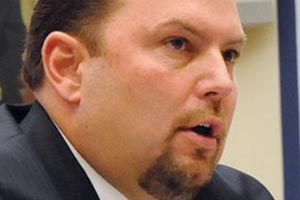Senior Reporter
Execs See Logistics Technology Accelerating, Predict Capacity Crunch, Seek Better Image

This story appears in the May 2 print edition of Transport Topics.
ORLANDO, Fla. — Trucking executives offered sweeping views of the future of the industry to shippers, including the need for more capacity, more advocacy and the coming of autonomous operations throughout the supply chain.
The executives made their remarks during a panel discussion at Nasstrac’s 2016 Shippers Conference and Transportation Expo here April 25-27.
Taking what he called a “contrarian view” at a time when capacity-restricting regulations are mounting, carrier bankruptcies are rising and truck production and orders are down, Werner Enterprises President Derek Leathers said the carrier is going to make more capital expenditures this year than in its 60-year history to reduce the age of its fleet.
Leathers said in an interview with Transport Topics that figure was between $400 million and $450 million, and that 80% of it would go to Class 8 trucks and trailers. He put the number of new trucks at “3,000 plus.”
“The table is set for a turn that we have not seen in a long, long time,” he said. “We want to be there with the best trucks, best drivers, best trailers with technology ready to catch that freight when it happens.”
Leathers also advised shippers concerned about paying higher rates to track how carriers spend that money.
“If you support your carrier, just make sure you follow the money,” he said. “If we ask for rate relief, rate support and we say it’s to take care of drivers and improve their life and their wages, and we want to retain them, make sure we do it.”
Turning to advocacy, UPS Freight President Jack Holmes shared insight on the National Freight Advisory Council, a board on which he sits.
“It’s the most diverse group of people you could ever imagine,” he said, adding it includes a lot of special interest safety advocates, and “they really look at us as like we are bad people.”
They paint a picture to regulators and others of “greedy trucking barons” consumed with making money at everyone’s expense.”
“We have to overcome that,” Holmes said. “At some point, we have to get our voice back and let people know we’re the safety advocates.”
FedEx Freight President Mike Ducker said it would be irresponsible for any top trucking executive to not have safety on the top of the agenda.
“I think we have to do a better job of communicating, of public relations, about what a fine job the trucking industry is doing.”
The Federal Motor Carrier Safety Administration released a report nine days before the meeting that, among other findings, showed the rate of large trucks involved in fatal crashes per 100 million miles traveled by those trucks declined by 6% to 1.34.
The improvement came as trucking drove 4 billion more miles in 2014, the latest year’s data, compared with 2013, FMCSA said.
“It is way beyond the pale … to not appreciate an industry that does 70% of the nation’s commerce on the road, Ducker said. “We need to advocate much better than we have.”
Leathers said one aspect that needs more support is strengthening the legislative prohibition against state and local governments regulating interstate trucking companies on pricing, routes and services.
For instance, there are new efforts by states to regulate when drivers take meal and rest breaks in addition to hours-of-service requirements, he said.
Mandating those extra breaks would increase the number of times trucks are entering and exiting highways, making right turns and close-quarter maneuvers — all of which are at the top of the list of causes of accidents, Leathers said.
“That is putting drivers directly in harm’s way,” he added.
Bradley Jacobs, CEO of XPO Logistics Inc., held out a different future once the industry engages fully with technology.
He said ELDS are at the beginning of a path leading toward “more and more automation, eventually autonomous vehicles, driverless trucks, machine-to-machine booking and programming of the load and vastly lower cost and greater efficiency.”
He said in 10 years that would be the lay of the land.
“It will all be automated — from the retailer to the manufacturer, to [distribution centers], the warehouses, to the final mile,” Jacobs said. “Even the OEM right at the beginning. It will all be automated by computers, and there will be very little human intervention.”
UPS ranks No. 1 on the Transport Topics Top 100 list of the largest U.S. and Canadian for-hire carriers, and FedEx Corp. is No. 2.
XPO is No. 14, but has acquired Con-Way Inc., which ranked No. 4. Werner is No. 16.

